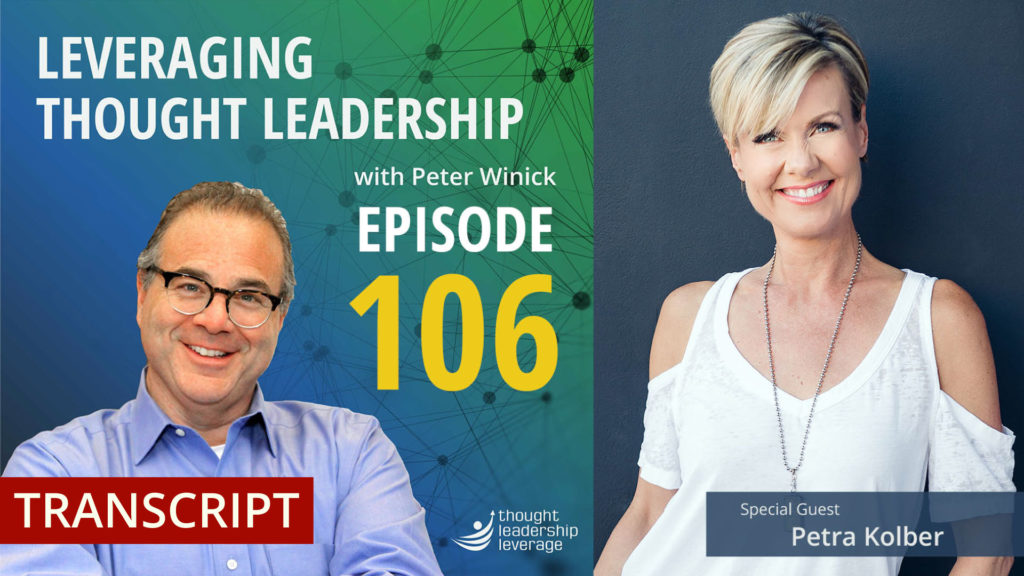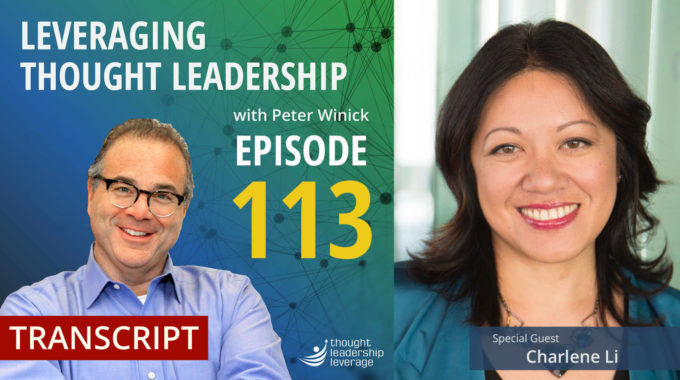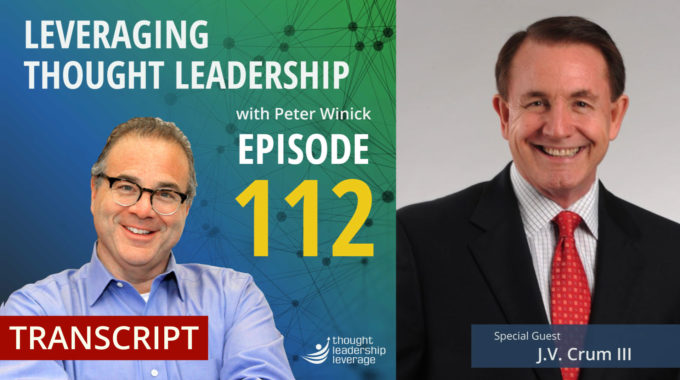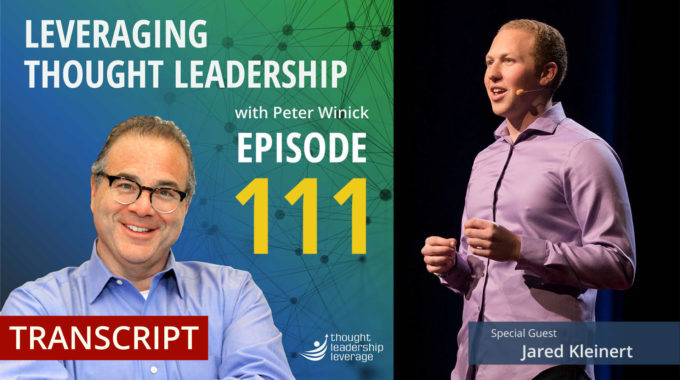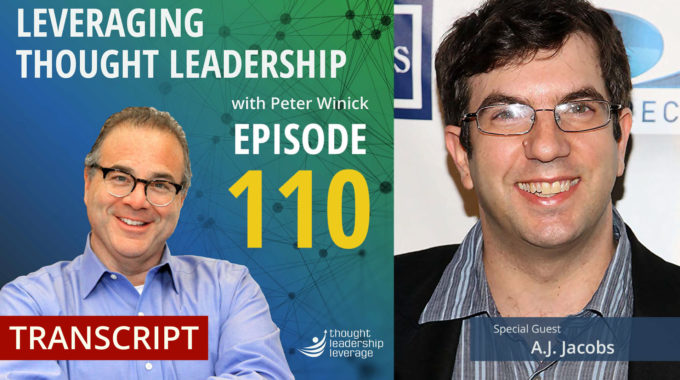Helping Your Thought Leadership Marketing Find Range, Reach, and Results. An interview with Charlene…
Thought Leadership Publishing | Petra Kolber
Using Thought Leadership Publishing to Create Long-Term Success.
An interview with Petra Kolber about thought leadership publishing, being accountable, and how to measure your thought leadership success.
We interviewed Petra Kolber, a fascinating thought leader who uses positive psychology, “The Perfection Detox,” and her own experience of over 30 years as a fitness expert to tune into the positive, dial-down the negative, and turn up the level of happiness and productivity in everyone!
Three Key Takeaways from the Interview:
- What to do when your thought leadership undergoes a “conscious transition.”
- Thought leadership publishing, and how to know when you’re ready to write!
- Building your thought leadership publishing in a way that will support your business and keep your audience engaged for years to come.
Transcript:
Peter And welcome, welcome, welcome, this is Peter Winick, founder and CEO of Thought Leadership Leverage. And you’re joining us on the podcast today, which is Leveraging Thought Leadership today. Interesting guest. Her name is Petra Kolber. She’s an internationally renowned fitness expert and wellness leader who known throughout the industry as a crusader for change and a beacon of authentic happiness. She’s pretty much transitioning from health and wellness to becoming a first-time author. So her new book is called The Perfection Detox. Tame Your Inner Critic, Live Bravely and Unleash Your Joy. So moving more into sort of core content that we tend to focus on the show as opposed to just sort of the help of all the stuff with just really part of who she is in her spare time. She’s an aspiring deejay. That’s interesting. A budding cook, an average traveler at a podcast made it anyway. Here we are. Welcome aboard, Petra. Thanks for joining us.
Petra Kolber Peter is a great thrill to be on your show.
Peter Oh, there we go. The bar is high. So you had a career as an album wellness fitness expert for a long, long time and saw that world go through a variety of changes in terms of the way people consume content from sort of DVD. If you order online in such a way that you’re sort of moving into a little bit of a different space. Tell us about the transition and then we’ll get into some of our content and we’re balanced.
Petra Kolber Yeah. So, Peter, I think the transition sometimes we make conscious transitions and sometimes we’re put into a place or we have to make that rapid pivot. And so that four years ago I came back to New York unexpectedly and I had a decision to make, do I stay in the world that’s known me for 30 years? And it’s a beautiful world, but it’s a world where at my age, it’s, you know, your days are numbered. Let’s put it that way. Or do I use this time to create a new path in the form of still working with the people? They’ve known me for like three decades. But reaching out to me in a different way. So it wasn’t leading with the physical aspect, but leading through the writing of my book, leading through keynote speaking and seeing if they’ll come along with me on this journey. That was really a pivot from originally, I was known as the choreography maven. I transition, first of all into positive psychology, creating a brand called Moving to Happiness. And now more recently, I call it the shadow side of the happy hour side. And that’s perfectionism. And I was blessed. I had a built in tribe, if you would like to call it that, came along for the journey and along the way have reached out to many more people that probably would not have found me in my original modality of being a fitness expert per say.
Peter Well, so. So you’ve got a part of the plan was to move some of the folks that knew you from one world into another. So let’s talk about sort of how do you take with you from one place and move to the next? The pieces that make sense and then leave behind those that don’t. You said that you’re the physicality and all of the demands of being the fitness base obviously would take its toll. What were the things that you’re developing now, vis-a-vis the Balkans or to the new world of speaking and such for you that some of it came from your previous world? What were you adding to it? How did that work?
Petra Kolber Thank you. That’s a great question. I think the first thing is, Peter, whatever modality you’re delivering, the biggest thing that I brought along with me was trust. I had built these peoples, this group of people, you know, thousands, tens of thousands people that trust for 30 years. So they were like an eye. So the one thing I really brought was trust, integrity. So they I had that three decades of credibility that they knew I wasn’t gonna just blow up. But then the part that I did see was the pain from the physical world was such a part of the pain that I could speak to because I had been working and teaching around the world to what would seemingly from the outside looking in women and men that were fricking looked amazing, but were so unhappy, all they could see was the one thing that was wrong with them. And so the part that transferred really well was Peter. The worst place for our happiness, our creativity, our focus, our leadership skills is sitting. So a new movement had to be a part of it, but it was just going to transition out of the type of movement I had done traditionally, which in fact now looking back, alienated the very people I was hoping to serve, because a lot of what I did for the majority of real humans that we don’t see inside of a gym was so far out of their reach. I just didn’t realize that at the time because I was teaching to the 10 percent that were already converted. I felt I could actually reach more people, but I had to take that leap into the white powder because in my past I’d say three decades I’d always had someone to follow. And now it’s going OK. I don’t think I’ve seen anyone doing it in this space. First of all, the fitness space, talking about positive psychology and then as my reach grew expanding into the perfectionism aspect.
Peter OK. So perfectionism has a lot of pieces to it. Let’s talk about how you find your space, which is sort of this overcoming perfectionism. Probably better way to say that, but that’s sort of the gist of it. How are you now creating content and getting it out there in order to build up the business side of these pieces of content that you put out that are free? And then there’s things that are people paying for in terms of speaking to. Walk us through some of the continuum of the samples that are out there for free that anyone can grab and sort of how that picks up the things that are people or organizations giving you good money.
Petra Kolber Yeah, I think that’s a real a challenging question, Peter. Only for the fact that the industry I came from was really good at celebrating wisdom, but not so great in paying for it. So it was this scarcity mindset and I had to get really comfortable with reassessing my knowledge and its value. So the first thing I did was I stayed with all I knew, which was a lot of free content. And that was my podcast on which I’m relaunching 20 episodes over the next couple of months. And then there was the book which while I did get a retain a foreign traditional publishing, as we know a book is a great, very expensive calling card. But it definitely it changed the people’s perception of me. Event planners meeting planners’ conferences. Once you have a book, that’s the first question. Is it while it does need to be traditionally published or self-published. That traditional publishing does add a cachet that helped me. And now I’m in the action, the process of creating an online program because I realize I love keynote speaking. But I had become. It was another gig economy which I had done very well and my fitness was showing up every weekend. But if I didn’t show up, I didn’t get paid. So I’m realizing I’m very strong in that area. I feel very comfortable in that area, Peter. And now I’m in the process of doing that. Evergreen product where gosh forbid, I can’t make it. I want to travel. I want to stay at home more. I’m developing more of that content to have a sustainable business was not trading dollars for hours.
Peter Interesting parallel to the world that you came from. I want to go back to a point that whatever somewhat quickly you’re in terms of the world of publishing and that the choices that everyone makes and there’s no one right or wrong choice. But how did you go about analyzing the market and then making a decision on which what was best for your traditional self?
Petra Kolber Well, I think for me, if I’m completely honest, Peter, if I didn’t have a publisher or an accountability partner, it probably would not have ever gotten written because it was so overwhelming to me. And yet something I knew people needed food like in when I was in the fitness world, people’s like, why don’t you write a book? I had no interest in writing about the diet and fitness book, yet I felt there was nothing really in the marketplace around this this topic. And I felt I could deliver in a way that was tangible, useable and very friendly. So I was there is a bit of luck to this because I do believe luck is preparation, meeting opportunity. And my agent’s wife had seen me speak and said, I love what you’re doing. You’ve even got one or two books in you on which my happiness and perfectionism. And the more I dialed it and beta tested it, I’m realizing, oh, it’s gonna be perfectionism. So I was blessed that the timing happened. I got a fantastic agent that probably without him, I don’t know if I would have gotten a traditional publisher. But we put it out, got five meetings, three of them fell through after I thought I had a great meeting. We had two people that wanted the book. And so I don’t have had let’s say that had fallen through. Can I honestly sit here and be speaking you today saying, yeah, I would have done it on my own? I don’t know because it’s so much work. But having that publisher and a deadline made me accountable.
Peter So interesting because most people the consideration is more around the business model. The creative control will raise all those costs, cash flow, etc. for you is just an interesting perspective. By making that commitment to a publisher, you know, I guess maybe this is sort of ironic given the perfectionism. You have to live up to that, right? Versus if you self-publish and you’re writing all the checks a little bit yourself. Well, you know, maybe what happened, maybe you would. Is that a fair recap of the story?
Petra Kolber Yeah, absolutely. You did it very succinctly. Thank you for that. And I think, you know, I think Peter to it. I did for the first time. I met with the publisher before we’d even signed the contract. I and again, look, one person can say something that it can be a very different journey. I’ve heard this from many authors. They really kept my voice and I worked. I basically wrote 95 percent of the book. I worked really hard to get across the finish line. In terms of delivering the content and how they position me in the marketplace and the book cover they went above, I got I got lucky again because I’ve heard horror stories. You get your content back, you don’t even recognize it. So I had very few tweaks. Yeah, I got lucky on that one.
Peter Yeah, OK. So then the book comes out and rainbows and unicorns and all of that. Right. Exactly. I’d made a million dollars and I’m retired and you know, some more layers of the. Then what happens?
Petra Kolber Yes. As I write this real story. And I think this is really I think this is maybe hopefully helpful to your listeners. Is that his idea, this ideal of how success looks in the publishing world? Your book releases, you get on the top ten list to make. And there’s so much pressure to make the list and. I kept my eye on the long game, I felt this book was gonna be an evergreen private product. It was gonna be like a Jenson’s Sarah where it took longer. I’d be lucky if, I mean, you know, it was gonna be the long game.
Peter Let me put you on that point, because I think that’s a crucial, crucial point. Often times I’ve seen it a hundred times, maybe a thousand times. People, authors get sort of sucked into what I’ll call the book industrial complex. And because the way the industry is set up, they have to treat the book as if it has a lifecycle of 90 days or six months as is that’s a seasonal item fashion where, you know, whatever the skirts are short this year and the one next year. But that’s not true when you think about the value to be extracting the meaning of the book to the author is you should be looking at your book is something that you’re amortizing the investment of time and energy over five plus year period, which is not the cadence that the book sort of world works in. So I love that you play the long game. I decorate any tension or friction between your objectives and the publishers.
Petra Kolber Okay. So the only place we had trouble with that was the copyright over the domain name. OK, I own the domain name. I’ve owned the perfection detox for like five years since I thought about it. I own every iteration of that domain name as a picnic would go out and get eighty seven of those domains. The first time I thought about it, of course, much. And you know, I trademarked it. I copyrighted. I’d already had a trademark issue unwittingly by someone in Europe, which we paid thousands of dollars already for this. And originally, I guess that this particular publisher was used to holding the domain name and I refuse to give it out. I’m like, no, no, no, because, you know, I got the thing I did realize. Peter. I get being a realist. August 15th, the book has been out one day. I’m now old news. They’re onto the next book. This is my I have to admit. Yes, of course. This is my five year IP that I’m going to build into courses and speaking and workshops and retreats. So that was the bit I got gotta say, I put on my big girl pants and I really fought tooth and nail. But I’m not budging on this. You know, I will. And we lucky we got it figured out and all this fantastic now. But that was a non-negotiable for me.
Peter Got it. OK, cool. So now the book’s out and then the book is obviously not where the financial impact happens. It’s where awareness more often happens. It’s a calling card. So now that the book’s out, what are the other avenues that you’ve gone down?
Petra Kolber Well, I think the biggest thing I saw, Peter, were a lot of book clubs were happening around there. So that there’s a lot of attention. Yeah. So especially in the New Year, I thought there’s this grassroots momentum that I had nothing to do with. And I thought, OK, now is the time to then leverage that interest because they’ve already gone through it into a more in-depth course that they can do with me in person. So that’s the first thing speaking. It affected in some ways, but not to the extent I took on it. To be honest, I thought it would it gave me leverage in the fact that some of the conferences I wanted to appear at, if they didn’t like my speaking fee, I was prepared to, you know, negotiate that for like buying books for your audience was another leverage tool. But definitely, I got to be honest here, I didn’t change my speaking as much as I thought it would. Some of that’s my own fault. I would say because I haven’t done any outreach yet, because I can only. And we spoke about this a little bit. There’s only so much I can do. I have people that help me. I’m kind of going for the I don’t it’s not lowest hanging fruit, but it’s the next thing I know I can do well and successfully on my own. Get that done. Use that as a marketing piece for the next thing I’m going to create. Get that done. Use of that for marketing piece for the next thing I’m going to create. So I do have to do a lot more work around outbound and outreach for my speaking because I know once I get book that often saying how can we get more of you? So again, it’s also then taking the speaking and not leaving it as a one on one thing to exchange. I speak, I leave. So now I’m also leveraging that into more long form content for their audiences and it just adds more value.
Peter Got it. It’s also not a sprint. Right. So you can do that in waves and fees for accomplishing everything in 90 days.
Petra Kolber No, exactly. And that’s the point I’m trying to be more mindful of. Because if you look at, you know, a lot of the thought leaders out there, it makes you think that you have to do it all all the time and do it all incredibly well. And I don’t know if this is a difference between male and female energy, but a lot of a lot of the people I follow and really respect, it can be exhausting to try and keep up to that pace. And then you kind of begin to feel like, oh, my God, I’m not doing enough. So it’s, you know, being inspired by other people, maybe 5, 10 years ahead of you, but also being realistic with the world that we live in right now, the amount of content that is possible to consume. The rate that it’s being consumed. And really. Fine tuning, where am I going to find my audience on a regular basis without being overwhelmed?
Peter What I would add to that, Petra, that the other thing is when we see people that we admire, that we’ve been following, that we. Wow, that’s interesting. I’d like that to replicate what they do. But, you know, their inspirations to you. What isn’t clear is how did they get there in terms of did that take them fifteen years to get where they are a little more easily be doing this a year, two or three. And, you know, I’m only here. You know, it would be interesting to be able to calibrate where you are against where those that you admire were at a similar time because it goes in the finish line. Right. So it’s sort of a built in stress.
Petra Kolber No. Yeah. One of my favorite quotes is I think if I John Cop is I don’t compare your beginning to someone else’s middle. But it’s really hard to do, especially when, you know, social media being hit by at all, you know, all angles. But I agree with you. If I could have that parameter going, hey, Petra, you’ve been at this for like 18 months. You’re doing awesome. That would be lovely. But no one can do that but yourself, you know.
Peter Exactly. And then and then you go and take another hit on Amazon to see how the book is doing in real time in the moment, which could cause its own level of addiction, of tracking those other of things. So what’s next now? Where do you see the content going in the business? Because you’re more in a transition transformation phase moving from one universe to another. So what what do you see happening over the next 18 months?
Petra Kolber Yeah. I think my sweet spot is alive. I mean, I think that’s my history from 30 years of being a present. I I love it, but I don’t want to ever become burnt out by it. So I’m kind of navigating two parts, creating much more online content ’cause I know I deliver high quality. I go above and beyond, as do all people that love what they do. So as balancing the online with the offline, I wouldn’t give up either either. You mentioned the deejaying at the beginning. And so part of it for myself is as a speak on you. You spoke to this with Jill and you know, her magic kryptonite is being behind the screen and being able to do amazing content across the screen. My kryptonite is alive, but I’m not a juggler. I don’t have you know, I’m not at number one, New York, New York, New York Times best on. But I know how to read an audience. I know how to get them out of their seats. I know how to create music and visuals that will transcend anything anyone could say in an hour. So that’s what I’m doing. I’m going back to school. I’m learning how to deejay. I’m going to bring music into it because, you know, music is your. And with that, you know, music is your kryptonite. You know, you couldn’t be more focused more. So, yeah, I’m exploring all of that. Trying to keep my curiosity and creativity engaged as well as doing the day to day implementation of, you know, CRM as an e-mail.
Peter What I also imagine some of the things that are natural to you or your kryptonite, as you describe it in the, quote, sort of alive world, you can move over into the normal. Not it’s not a one for one. Right. Because it’s an asynchronous piece. But you can take some of the best practices that you know from mastering your craft a long time in real time, face to face and say these are the these are the parts that I can bring over to digital experience.
Petra Kolber Yeah, absolutely. You know, like we think you would talk about with the day is like, you know, a lot of the webinars we see are and there’s nothing wrong in this. All fantastic, beautiful slides and the person’s voice behind it. That is not for me. I don’t do it that way. It’s like I need, you know, even this I’m even I’m looking at a screen. I want people at the other end to feel that I’m talking to their hearts. So I have to create and deliver content in a way that resonates with me. Offer it in many different variables because I know people’s time. They’re not they’re not going to necessarily have time to sit for an hour. So then they’ll have the podcast var. the downloadable. So delivered in many ways as possible. But like you said, if we do recognize our strengths and still work on the areas that need to be tended to, we can cross all platforms and ask for help when we need to.
Peter Awesome. Well, this has been great. Thank you so much for sharing your journey with us. It’s an interesting little bit different than what we usually talk about here, but a transition transformation from sort of one domains, one other, although not leaving the path entirely by. I appreciate your sharing that. You would like to learn to like you so much.
Petra Kolber Thank you for having me.
For some great advice from Peter on “Scaling You” check out this short video.
